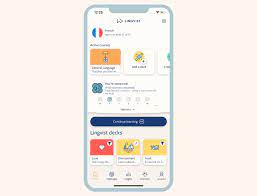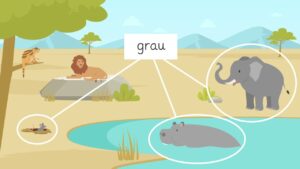German Adjectives
Adjectives are building blocks of a language. They enable us to describe things, express feelings and convey judgments or evaluations. A language without adjectives would be bland. I won’t lie to you: German adjectives are not a piece of cake. You need a few lessons to learn German adjectives and grasp their proper use. On a positive note, adjectives in German function in a highly structured way – just like anything in the German language. Once you've mastered underlying patterns and learned how endings change, you can use descriptive sentences and sound proficient.
Join our instructor Birgit and her American student Alex to learn more. Using a humorous dialogue, they’ll be covering useful German adjectives and showing you that German is not as spooky as it’s painted.
What You Need to Know About German Adjectives
- Hi Alex! Are you ready to make your brain work super intensively for the next half an hour?
- Wait, wait!
- ...
- Okay, let's do this.
- Where did you go?
- To scream into a pillow, don't worry, I'm ready for a grammar lesson now.
- Okay... Today, we’re starting with German adjectives:
- their types: predicative and attributive
- declension/inflection rules
- degrees of comparison
- opposites - use of "un" prefix adjectives.
In simple terms, adjectives are elements of speech that allow us to describe nouns and pronouns. You can't speak German properly if you don’t have a decent knowledge of German adjectives.
- Hold on, Frau Birgit! I didn’t even say "hello’" and you’re already rambling. Morgen to you!
- Yeah, sorry if I was rude, Alex! Guten Morgen! I’m just trying to pack it all into 30 minutes and make sure you leave with a solid understanding of how to use adjectives in German.
- I’ll be ein schlau Student after this class.
- No, you won't. You'll be ein schlauer Student. Mind the appropriate ending. The Student noun is masculine, so you need the -er ending in the Nominative case.
- Never mind beer and sausage, inflections are my favorite part of German.
- Oh, hello Herr Sarcasm. It's you again! Die katze lässt das Mausen nicht.
- Is that Gerrman for A leopard never changes its spots?
- Yes! You’re better with idioms than with German adjective endings. Well, let’s start hardcore: adjective word order and declension. Once we’ve got this covered, we'll only have the fun stuff to work on.
- I highly doubt there's any fun stuff, but I'll give you the benefit of the doubt.
FAQ: Do adjectives come before or after the noun in German?
German adjectives may come either before or after a noun. They are only declined if they come before a noun. In this case, they take on all the properties of that noun: gender (masculine, feminine, neuter), number (singular, plural), and case (Nominative, Genitive, Dative, Accusative).
Declension of German Adjectives:
- As you remember (I hope), German nouns can be any of three genders: masculine (der / ein), feminine (die / eine), and neuter (das / ein). You need to know the noun gender to match the noun with the adjective in German.
- That’s where this schlauer Student comes from.
- Exactly! Du bist schlau indeed.
- Hold on, Birgit! Why schlau again? Why not schlauer? I’m losing my wits. It's the same noun - Student.
- Calm down, Herr Panic! One thing at a time. German adjectives are divided into two groups:
1) those after a noun
2) those before a noun
Let’s start with the former as they are super easy.
Predicative adjectives – Internet ist langsam
- Here’s some info you’ll love, Alex. German adjectives that come after a noun need no special endings. So, you have Alex ist klug versus Alex ist ein kluger Student.
- Keep showering me with compliments. Deine Komplimente sind so schön.
- Meet our Herr Big Head! Now, focus, please. These are predicative adjectives in German. They define the predicate, which, in this case, is the zu sein verb. Would you give me an example to demonstrate your understanding of such German adjectives?
- Sure. I’m klug. I'll go with Birgit ist streng (Birgit is strict).
- Whatever helps you learn German, Herr Amerikaner.
Attributive adjectives – Das langsame Internet
- Now, let’s look at attributive adjectives – the ones that come after nouns. Their endings change depending on the noun gender.
- Tables incoming.
- Could I be more predictable? German has two types of articles, like English: indefinite articles (ein / eine/ ein and their case variations) and definite articles (der / die / das and their case variations). German adjective endings are determined by them.
- And then we, poor people, have to cram these endings. Life's unfair.
- Das Leben ist unfair. That's right. Let’s start with indefinite articles. Mind that German kein and possessive pronouns (mein/dein/sein/ihr/unser) decline similarly.
- "Klein"?
- The word is "kein". We use kein instead of nicht before a noun.
Ich habe kein Auto (I have no car) versus Mein Auto ist nicht schnell (My car is not fast).
Table #1 – Adjectives after an indefinite article, a possessive pronoun, or kein
| Singular masculine | Singular feminine | Singular neuter | Plural (all genders) *plural is not used with an indefinite article | |
| Nominative | —er | —e | —es | —er |
| Accusative | —en | —e | —es | —en |
| Genitive | —en | —en | —en | —en |
| Dative | —en | —en | —en | —en |
- Great, now I can say Frau Birgit ist eine strenge Lehrerin.
- Bravo!
- Yeah, with a table in front of me. But I'll again end up with Du bist gut Frau when I start flirting. No article, no proper adjective, no ending. Just a couple of words put together.
- With a bit of practice, you'll improve your German adjectives, just like your pick-up lines, Alex. By the way, check this great video where Heidi Klum and her daughter are answering questions about each other. They’re using a ton of useful German vocabulary to describe each other's hobbies, habits, and routines.
Exampe #1

Was ist denn mein perfekter Sonntag? 03:09 - 03:11
- Hmm… Mein Perfekter Sonntag ist Deustch lernen.
- Yeah, Herr Lier. Now, let’s take a look at definite article inflections.
Table #2 – Adjectives after a definite article
| Singular masculine | Singular feminine | Singular neuter | Plural (all genders) | |
| Nominative | —e | —e | —e | —en |
| Accusative | —en | —e | —e | —en |
| Genitive | —en | —en | —en | —en |
| Dative | —en | —en | —en | —en |
- Man, they look completely different from the indefinite ones. Yay...
- This thing indeed requires some effort to master. But again, it’s only possible with practice. Go ahead and disarm me with some perfect pick-up sentences featuring German adjectives.
- Double challenge accepted. Die schönen Blumen sind für dich. Sie passen zu deinen blauen Augen.
- Es ist total süß. Meine Augen sind blau. Ich sehe aber keine Blumen. That’s great you’ve also used Dative, not only Nominative. Du lernst schnell!
- Ich werde jetzt errötet, Birgit.
- Yeah, right, Mr. Shy.
FAQ: What is strong declension German?
Strong declension means that an adjective is not preceded by an article (definite or indefinite) and, thus, takes on its properties before a noun. Strong adjectives are conjugated similarly to the definite article, with the exception of masculine and neuter nouns in Genitive (-en ending instead of -es ending).
One should also remember that the adjective ends with -es rather than -as (das) for neuter nouns.
Degrees of Comparison: langsam-langsamer-der langsamste
- There’s nothing difficult about German degrees of comparison. You just take an adjective (e.g., schön) and add either -er or -est to its base for the comparative and superlative form respectively. To match German adjectives with nouns and pronouns, check the previously provided tables.
- And another table follows...
- Exactly, Alex! Here’s the table with comparative and superlative adjective forms:
Table #3 – Degrees of comparison
| German adjective | English adjective | German comparative | English comparative | German superlative | English superlative |
| frisch | fresh | frischer | fresher | frischest | freshest |
| schnell | fast | schneller | faster | schnellest | fastest |
| kalt | cold | kälter | colder | kältest | coldest |
| jung | young | jünger | younger | jüngest | youngest |
| nah | near | näher | nearer | nähst | nearest |
| gut | good | besser | better | best | best |
| viel | much | mehr | more | meist | most |
I get the last two examples – gut and viel – as that’s the same in English. But how the hell do I know when to use umlauts in words?
- I feared this question, Alex. You need to beware of the root a/o/u and remember forms that take on umlauts by heart. The list of these adjectives is long, but it’s finite.
- They said German was the most structured language of all…
- Stop whining, Alex. You'd better check this guy's video for more comparative forms. Listen to him describe his experience in Germany and try to spot these words:
Example #2

- Ok, and what's going on with superlative German adjectives?
- You use a definite article (der / die / das), just like the English "the": Dein BMW ist das schnellste Auto von allen.
- Yeah, I wish. What we have instead is Birgit, deine Sprache, ist die schwerste Sprache der Welt.
FAQ: What is the comparative form of Alt in German?
German monosyllabic adjectives with "a", "o", and "u" vowels typically take on umlauts in the comparative and superlative degrees. "Alt" thus becomes "älter" in the comparative form and "der älteste" in the superlative form. The same holds for "kalt" ("kälter" - "der kälteste") and "jung" ("jünger" - "der jüngste'".
Unglaublich: Creating Opposites With -Un
- We’ve approached the part that’s so easy I’m not even sure I should explain it.
- What all great teachers say.
- I’m not joking. In German, like in English, you often have to add the -un prefix to form an opposite adjective. Although it doesn’t work like this for all words (e.g., the opposite of alt is jung, not unalt), the list is quite long:
- glücklich – unglücklich -> happy - unhappy
- gesund – ungesund -> healthy – unhealthy
- ehrlich – unehrlich -> honest – dishonest
- möglich – unmöglich -> possible – impossible
- geduldig – ungeduldig -> patient – impatient
This person in the video also uses -un in the unverschämt (impudent) adjective.
Example #3

Ich bin heute hier an dem Punkt, wo wir als Deutsche unverschämt die Welt in Ohnmacht und im ganz großen... in einen ganz großen Krieg gezogen haben, mit so viel Leid auf der ganzen Welt. 03:35- 03:55
- Hmm… I’m reluctant to say this, but it's easy. So this -un prefix replaces all negative prefixes we have in English. Unglaublich (unbelievable).
- Es ist leicht! Now, could you give me a few examples?
- Sometimes I wonder who's teaching here!
Alex ist ein sehr fleißiger und geduldiger Mensch, der eine sehr unromantische Sprache lernt. Wäre Alex ungeduldig und unfleißig, würde es unmöglich sein.
- Wow! I’m impressed you've used the Subjunctive! The only thing is there’s no such word as unfleißig. It's faul. By the way, you can easily remember it with this kids' verse:
Ich bin Peter, du bist Paul,
Ich bin fleißig, du bist faul.
- Hey, I’ve got one too:
Ich bin Alex, du bist Birgit,
Ich bin müde, du bist streng.
- Du bist der beste, Alex! Your sense of humor is enchanting.
FAQ: How do you negate adjectives in German?
To negate a German adjective, we use "nicht" before the respective adjective: e.g., "Die Tasche ist nicht rot" (The purse is not red), "Dein Auto ist nicht neu" (Your car isn't new)'. We cannot use "kein" in such cases because "kein" negates nouns in German: e.g., "Ich habe kein Geld" (I have no money), "Er ist kein Artzt" (He isn't a doctor).
Some Popular Adjectives and Their Use in Context
- Now, the last and most pleasant part of our lesson, Alex. Let’s take a look at these useful adjectives and pay attention to each adjective's ending in the sentence.
- As long as you’re the one providing examples, I’m fine.
- Heh. Your turn shall arrive, Alex. Check this table with adjective examples.
Table #4 - Adjectives and their use
| German | English | Example |
| MAIN COLORS | ||
| weiß | white | Ich habe eine neue weiße Bluse gekauft. |
| schwarz | black | Ich trinke immer schwarzen Kaffee. |
| blau | blue | Diese Jeans sind blau. |
| grün | green | Ich mag die grünen Bäume. |
| rot | red | Ich suche ein rotes Kleid. |
| braun | brown | Magst du die braune Farbe? |
| gelb | yellow | Die Sonne ist gelb. |
| grau | grey | Schau, wie grau der Himmel heute ist! |
| rosa | pink | Hast du ihr rosa Auto schon gesehen? |
| orange | orange | Was für eine orange Tasche! |
| EMOTIONS, FEELINGS, AND PERSONALITY | ||
| schlau/ klug | smart | Er ist so ein schlauer /kluger Student! |
| brav | well behaved | So ein braves Kind! |
| glücklich | happy | Was macht dich glücklich? |
| traurig | sad | Warum sieht sie immer so traurig aus? |
| hilfsbereit | ready to help | Diese Menschen sind immer hilfsbereit. |
| offen | sociable | Er mag Partys und ist ein sehr offener junger Mann. |
| charmant | charming | Dieser Politiker ist ein ganz charmanter Mann. |
| wütend | angry | Sei nicht so wütend auf das Kind! |
| gespannt | excited | Er ist gespannt, was daraus wird. |
| genervt | nervous | Sie war total genervt. |
| schüchtern | shy | Er ist ein schüchterner Junge. |
| SOUND, TOUCH, TASTE | ||
| laut | loud | Ich hasse laute Musik. |
| leise | quiet | Sie hörte leise Schritte. |
| kalt | cold | Meine Mutter mag keine kalten Getränke. |
| warm | warm | Sie würde gerne warme Suppe essen. |
| weich | soft | Der Teppich ist voll weich. |
| heiß | hot | Es ist immer heiß hier. |
| süß | sweet | Magst du süße Milchsuppe? |
| salzig | salty | Dieses Brötchen ist zu salzig für sie. |
| lecker | yummy | Meine Freundin kann die leckerste Torte backen. |
| SIZE AND AGE | ||
| klein | small | Ihr Bruder ist noch klein. |
| groß | big | Du bist eine große Schwester jetzt. |
| lang | long | Diese Nacht war lang für sie. |
| kurz | short | Ihre Haare sind blau und kurz. |
| jung | young | Ich arbeite in einem jungen Team. |
| alt | old | Seine Großeltern sind schon alt. |
| CHARACTERISTICS OF THINGS | ||
| teuer | expensive | Die Wohnung ist ziemlich teuer. |
| billig | cheap | Sie kauft jetzt nur billige Kleidung, weil sie wenig Geld hat. |
| leicht | light | Hast du ein leichtes Sommerkleid? |
| schwer | heavy | Diese Koffer sind schwer. |
| neu | new | Der Junge hat ein neues Hobby gefunden. |
| sauber | clean | Ich mag es, wenn die Wohnung sauber ist. |
| schmutzig | dirty | Die Katze war ganz schmutzig. |
| CHARACTERISTICS OF CONCEPTS | ||
| richtig | right | Es war eine richtige Wahl. |
| falsch | false | Die Antwort ist falsch. |
| kompliziert | complicated | Flüchtlingskrise ist ein kompiziertest Thema für uns. |
| wichtig | important | Ihr Buch ist ganz wichtig. |
- Man, that’s quite a list of sentences. Cheap clothes, blue jeans, charming politicians. Sounds like a very weird spell.
- I know it’s a lot. But remember: You need to learn German adjectives to speak German fluently. Isn't that what you want? So, be patient and check this video for more adjective examples in use:
Example #4

Das sind zwei ältere Männer mit grauen Haaren. 01:11 - 01:16
- Is this the part where you ask me to come up with examples?
- You’re 100% right, Alex.
- Well, let me sum it up this way:
Deutsch ist eine sehr wichtige und komplizierte Sprache. Deshalb kaufe ich teuere Bücher und lerne neue Wörter jeden Tag. Ich bin brav und fleißig.
- Bravo! Alle Sätze sind richtig.
- Spitze! The lesson is over. Gehen wir jetzt heißen Kaffee trinken. No gender, plural, nominative, noun talk. Just a cup o' joe.
FAQ: How do you make adjectives in German?
In German, like in English, a past participle verb can serve as an adjective. You need to use proper inflections added to it before a noun, though: e.g., seine enttäuschte Frau (his disappointed wife). The same holds for German present participle verbs: e.g., eine überraschende Geschichte (a surprising story).
Wrapping up
The German adjectives are not that daunting now when you’ve covered some rules, right? The more you practice with us, the easier they will seem. Go over the adjectives in this lesson once again, better twice. You’ll be amazed how easily they stick with you. You’ll eventually reach a point when you can't remember why you considered German adjectives a nightmare in the first place.
Birgit and Alex have already started working on new dialogues for you. Follow their entertaining lessons and become inspired to improve your German. And remember: Du bist schlauer als du glaubst (You are smarter than you think).






